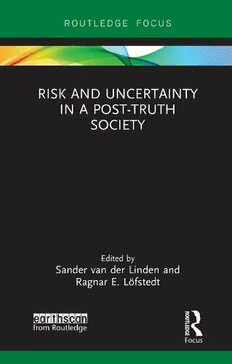
Risk and Uncertainty in a Post-Truth Society PDF
Preview Risk and Uncertainty in a Post-Truth Society
“The question of what constitutes acceptable risk has always involved a judgement about both science and politics. This issue is brought into sharp focus in this volume about the changing relationship between science, novel risks and society. The contributors, drawn from aca- demia and the world of government policy, show how this relationship is of critical importance for the ways we now think about trust in insti- tutions and risk governance. The important message of the book is that while we have not yet reached a ‘post-truth’ world in decision-making about risks, we need to guard against such a situation happening in the future. A timely and welcome contribution to a critical contempo- rary societal debate.” Nick Pidgeon MBE, Professor and Director of the Understanding Risk Research Group, Cardiff University, UK Risk and Uncertainty in a Post-Truth Society This edited volume looks at whether it is possible to be more trans- parent about uncertainty in scientific evidence without undermining public understanding and trust. With contributions from leading experts in the field, this book e xplores the communication of risk and decision-making in an increasingly post-truth world. Drawing on case studies from climate change to genetic testing, the authors argue for better quality evidence synthesis to cut through the noise and highlight the need for more structured pub- lic dialogue. For uncertainty in scientific evidence to be c ommunicated effectively, they conclude that trustworthiness is vital: the data and methods underlying statistics must be transparent, valid, and sound, and the numbers need to demonstrate practical utility and add social value to people’s lives. Presenting a conceptual framework to help navigate the reader through the key social and scientific challenges of a post-truth era, this book will be of great relevance to students, scholars, and policy- makers with an interest in risk analysis and communication. Sander van der Linden is Assistant Professor of Social Psychology at the University of Cambridge, UK, where he directs the Cambridge Social Decision-Making Laboratory. Ragnar E. Löfstedt is Professor of Risk Management at King’s College London, UK, and Director of King’s Centre for Risk Management. Earthscan Risk in Society series Edited by Ragnar E. Löfstedt, King’s College London, UK Protecting Seniors Against Environmental Disasters From Hazards and Vulnerability to Prevention and Resilience Michael R. Greenberg Anthropology and Risk Åsa Boholm Explaining Risk Analysis Protecting Health and the Environment Michael R. Greenberg Risk Conundrums Solving Unsolvable Problems Edited by Roger E. Kasperson Siting Noxious Facilities Integrating Location Economics and Risk Analysis to Protect Environmental Health and Investments Michael R. Greenberg Moral Responsibility and Risk in Society Examples from Emerging Technologies, Public Health and Environment Jessica Nihlén Fahlquist Risk and Uncertainty in a Post-Truth Society Edited by Sander van der Linden and Ragnar E. Löfstedt For more information about this series, please visit: https://www. routledge.com/Earthscan-Risk-in-Society/book-series/ERSS Risk and Uncertainty in a Post-Truth Society Edited by Sander van der Linden and Ragnar E. Löfstedt First published 2019 by Routledge 2 Park Square, Milton Park, Abingdon, Oxon OX14 4RN and by Routledge 52 Vanderbilt Avenue, New York, NY 10017 Routledge is an imprint of the Taylor & Francis Group, an informa business © 2019 selection and editorial matter, Sander van der Linden and Ragnar E. Löfstedt; individual chapters, the contributors The right of Sander van der Linden and Ragnar E. Löfstedt to be identified as the authors of the editorial material, and of the authors for their individual chapters, has been asserted in accordance with sections 77 and 78 of the Copyright, Designs and Patents Act 1988. All rights reserved. No part of this book may be reprinted or reproduced or utilised in any form or by any electronic, mechanical, or other means, now known or hereafter invented, including photocopying and recording, or in any information storage or retrieval system, without permission in writing from the publishers. Trademark notice: Product or corporate names may be trademarks or registered trademarks, and are used only for identification and explanation without intent to infringe. British Library Cataloguing-in-Publication Data A catalogue record for this book is available from the British Library Library of Congress Cataloging-in-Publication Data A catalog record has been requested for this book ISBN: 978-0-367-23543-7 (hbk) ISBN: 978-0-429-28029-0 (ebk) Typeset in Times New Roman by codeMantra Contents List of figures viii List of tables ix List of contributors x Foreword xii BARUCH FISCHHOFF Introduction: risk and uncertainty in a post-truth society 1 SANDER VAN DER LINDEN AND RAgNAR E. LöFSTEDT 1 Trust in numbers 4 DAVID J. SPIEgELHALTER 2 Science policy in a post-truth world 26 EMMA WOODS 3 Trustworthiness, quality, and value: the regulation of official statistics in a post-truth age 44 ED HUMPHERSON 4 Risk and uncertainty in the context of government decision-making 54 IAN L. BOYD 5 The handling of uncertainty: a risk manager’s perspective 74 gEOFFREY PODgER Index 79 Figures 1.1 ‘Questionable research practices’ (QRPs) admitted by 2,155 US academic psychologists (John, Loewenstein & Prelec 2012) 7 1.2 A simplistic diagram of the traditional information flows from statistical sources through to the public. The dashed lines indicate filters arising from questionable research, interpretation and communication practices (QRPs and QICPs), such as selective reporting, lack of context, and exaggeration of importance 11 1.3 Potential for the assessment of trustworthiness of statistical evidence 19 2.1 Principles for good evidence synthesis for policy 32 3.1 The three pillars and 14 principles of the UK’s new Code of Practice 51 Tables 1.1 Proposals from the ‘manifesto for reproducible science’ (Munafò et al. 2017) 9 1.2 Who is trusted as a source of medical research information? Responses from 1,500 UK adults (Wellcome Trust 2017) 10 1.3 Some highly questionable interpretation and communication practices (QICPs) 11
